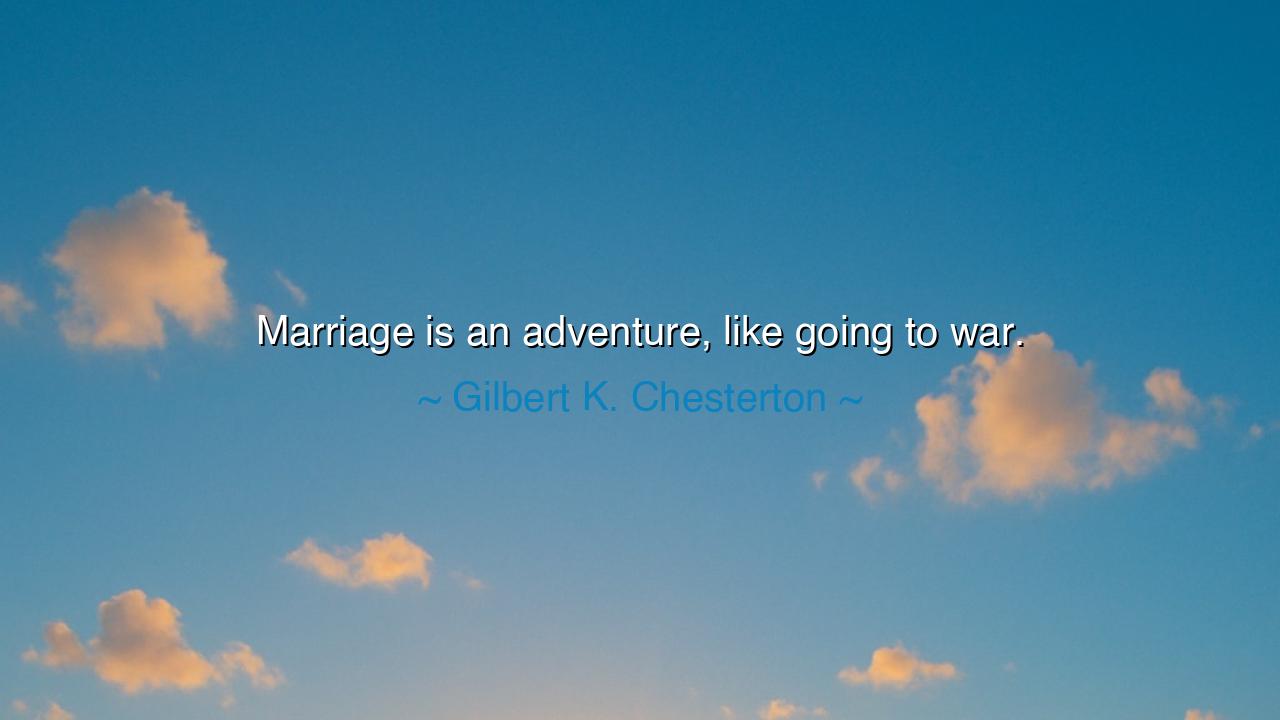
Marriage is an adventure, like going to war.






The words of Gilbert K. Chesterton—“Marriage is an adventure, like going to war.”—carry the thunder of paradox and the warmth of truth. In his inimitable way, Chesterton cloaked profound wisdom in the garments of wit. Beneath the humor lies a truth as old as love itself: that marriage, like all noble undertakings, demands courage, sacrifice, and endurance. It is not a stroll through gardens but a march through unknown lands, where trials test the heart as much as triumphs strengthen it. He saw marriage not as a cage that confines the soul, but as a battlefield where the soul learns its true strength.
The origin of this quote rests within the writings and philosophy of Chesterton, that towering defender of faith, paradox, and common sense. Living in an age of cynicism, he often spoke of marriage as the last great adventure left to humankind. To him, the modern world had stripped life of its mystery, replacing passion with ease and permanence with novelty. In comparing marriage to war, Chesterton was not exalting conflict but celebrating bravery—the bravery to love one person wholly, day after day, through both joy and hardship. For he knew that to bind one’s destiny to another’s is to step into a lifelong campaign for patience, forgiveness, and faith.
Like the soldier, the married soul leaves behind the safety of the familiar and ventures into the unpredictable. Each partner must confront not only the world but the hidden weaknesses within themselves—selfishness, pride, fear, and weariness. The vows of marriage are not words of convenience but oaths of honor, sworn in the face of uncertainty. And just as war reveals a soldier’s courage, marriage reveals a person’s depth. In battle, one learns to stand firm amid chaos; in marriage, one learns to love amid imperfection. Both demand endurance when the heart falters and valor when hope seems dim.
History offers us countless mirrors for this truth. Consider John and Abigail Adams, whose letters during the American Revolution reveal a love both tested and refined by distance, duty, and fear. As John helped forge a nation far from home, Abigail kept their household strong and raised their children alone. Their marriage was indeed an adventure—fraught with loneliness, sacrifice, and peril. Yet in their letters, one finds not complaint but devotion forged in struggle. They fought not against one another, but side by side against the storms of life. And when peace finally came, their love was not the fragile flame of youth but the steady light of endurance. Thus, through hardship, they discovered the glory hidden in loyalty.
Chesterton’s wisdom also warns against the illusion that love should always be easy. The modern spirit often seeks comfort above commitment, passion above perseverance. But true love is not comfort—it is courage. To love deeply is to expose oneself to pain, misunderstanding, and change. Yet therein lies its adventure: to wake each day and choose love again, even when weariness tempts retreat. The soldier who runs from battle gains safety but loses honor; the lover who runs from difficulty gains solitude but loses greatness. For marriage, like war, is not won in moments of glory but in the quiet endurance of daily sacrifice.
Yet Chesterton did not speak of marriage with bitterness. His comparison to war was not a lament but a celebration. For though battle is perilous, it is also glorious when fought for a worthy cause. And what cause is greater than love—the union of two souls striving toward one destiny? To enter marriage is to enter into the grandest of adventures, one that transforms both participants. It is to stand shoulder to shoulder, facing life’s uncertainties, armed not with weapons but with faith, laughter, and loyalty. And though the world may wound, the couple who endures together finds victory not in conquest, but in communion.
So, my child, remember this teaching: do not seek in marriage an escape from struggle—seek in it a purpose worth struggling for. When you love, love as a warrior—bravely, steadfastly, without retreat. Do not be dismayed by hardship, for every trial is a lesson and every wound a deeper bond. The adventure is not meant to be easy; it is meant to be meaningful. And in that meaning lies joy—the joy of knowing that you have fought and loved with all your heart.
Thus, Chesterton’s words echo across the ages, calling to all who dare to love: “Marriage is an adventure, like going to war.” Enter it not with fear, but with valor. For though the journey will test you, it will also transform you. And in the end, when the battles are done and the years have passed, you will find that love—tested, tempered, and triumphant—is the greatest victory of all.






AAdministratorAdministrator
Welcome, honored guests. Please leave a comment, we will respond soon